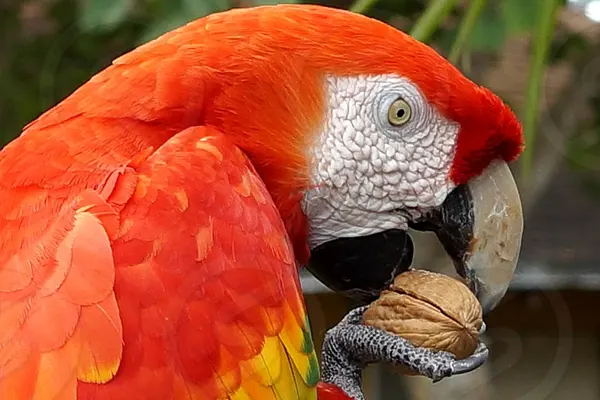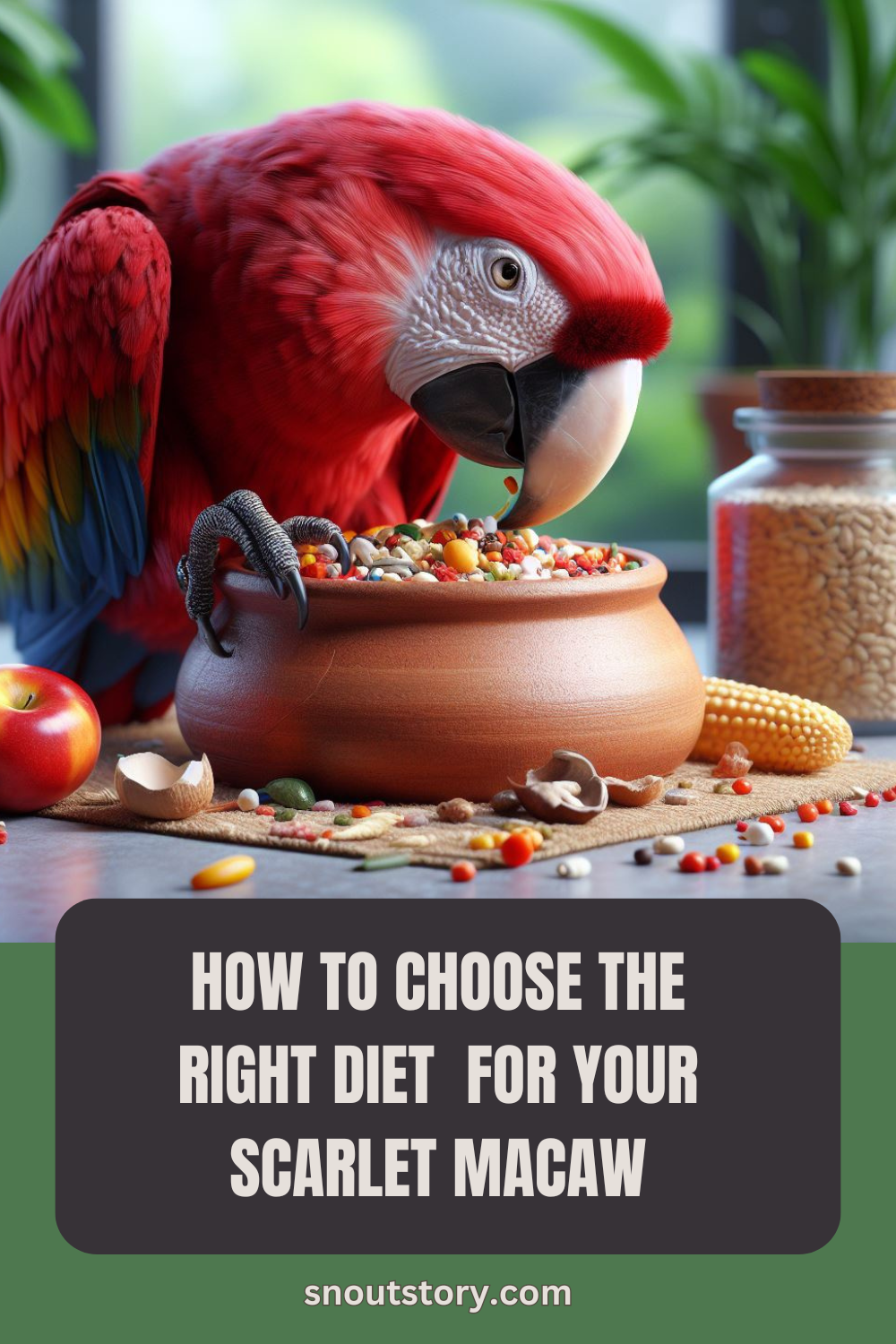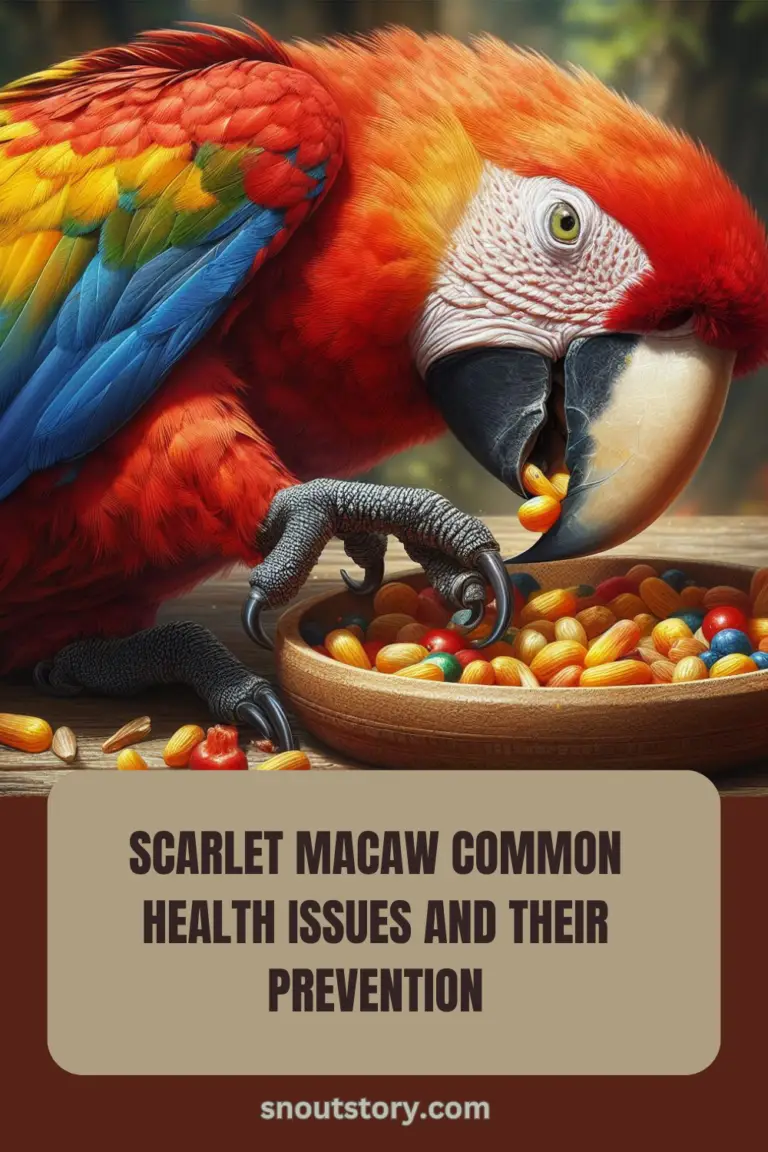Welcome Bird keeper and enthusiasts to our guide on Scarlet Macaw nutrition and diet, where we scrabble around into the dietary needs of these magnificent birds to ensure their health and vitality in captivity.
Scarlet Macaws are not only known for their stunning plumage but also for their unique dietary requirements, which play a crucial role in maintaining their overall well-being. In this comprehensive discussion, we’ll explore the natural diet of Scarlet Macaws in the wild, the nutritional needs they have in captivity, and the best practices for feeding them a balanced diet that supports their physical and emotional health.
Whether you’re a new Scarlet Macaw owner or an experienced bird enthusiast, understanding their nutritional needs is essential for providing them with a long and fulfilling life. Let’s embark on this journey together to discover the secrets of optimal nutrition for Scarlet Macaws!
What Do Scarlet Macaws Eat in The Wild (Natural Diet)
In their natural habitat, Scarlet Macaws primarily feed on a diverse range of fruits, nuts, seeds, and berries found in the rainforests of Central and South America. Their diet consists of various palm fruits, including palm nuts, as well as tropical fruits like papayas, mangoes, and guavas.
Additionally, Scarlet Macaws consume seeds from a variety of plant species, such as sunflower seeds and pine nuts. Their natural diet also includes occasional protein sources like insects and small vertebrates. This diverse and nutrient-rich diet provides them with essential vitamins, minerals, and antioxidants necessary for their overall health and vitality.
Scarlet Macaws have evolved to thrive on such a diet, which offers a balance of carbohydrates, fats, and proteins to meet their energetic and nutritional requirements in the wild. Understanding their natural diet is crucial for replicating similar nutritional profiles in captive settings to ensure their well-being and longevity.
Scarlet Macaw – Captive Diet Requirements
In captivity, meeting the dietary requirements of Scarlet Macaws is paramount for ensuring their health and well-being. A balanced diet for these magnificent birds should mimic their natural diet as closely as possible, incorporating a variety of fruits, vegetables, nuts, seeds, and grains.

Fresh fruits like apples, bananas, oranges, and grapes provide essential vitamins and minerals, while vegetables such as carrots, bell peppers, and leafy greens offer crucial dietary fiber and antioxidants. Additionally, offering a mix of nuts and seeds like almonds, walnuts, sunflower seeds, and pumpkin seeds can provide healthy fats, proteins, and essential fatty acids.
It’s essential to avoid feeding them foods high in sugar, salt, or fat, as well as toxic foods like avocado and chocolate. Providing clean, fresh water daily is also vital for hydration. Regularly monitoring their diet and consulting with avian veterinarians or aviculturists can help ensure that their dietary needs are adequately met, promoting their overall health and vitality in captivity.
Feeding Fresh Foods vs. Pelleted Diets to Your Scarlet Macaws
When considering the dietary needs of Scarlet Macaws, the debate between fresh foods and pelleted diets often arises. While both options have their merits, there are essential factors to consider for the overall health and well-being of these magnificent birds.
Fresh Food Pros:
- Nutrient Variety: Fresh foods offer a diverse range of nutrients, vitamins, and minerals essential for macaw health.
- Mental Stimulation: Chewing and foraging through fresh fruits, vegetables, nuts, and seeds provides enrichment and mental stimulation.
- Natural Diet: Mimics the natural diet of Scarlet Macaws in the wild, promoting natural behaviors and instincts.
- Hydration: Many fresh foods have high water content, aiding in hydration and preventing dehydration.
- Dietary Flexibility: Owners can customize the diet based on individual bird preferences and nutritional needs.
Fresh Food Cons:
- Spoilage: Fresh foods have a limited shelf life and may spoil quickly if not consumed promptly.
- Preparation Time: Requires regular preparation and chopping of fresh ingredients, which can be time-consuming.
- Seasonal Availability: Availability of certain fresh foods may vary seasonally, limiting dietary variety at times.
- Messiness: Fresh foods can be messy, leading to additional cleanup and maintenance of the bird’s enclosure.
- Nutritional Imbalance: Incorrect portioning or an unbalanced variety of fresh foods may lead to nutritional deficiencies.
Pelleted Diets Pros:
- Complete Nutrition: Pelleted diets are formulated to provide a balanced combination of essential nutrients, vitamins, and minerals.
- Convenience: Ready-to-eat pellets offer convenience for owners and ensure consistent nutrition in each serving.
- Long Shelf Life: Pellets have a long shelf life and are less prone to spoilage compared to fresh foods.
- Portion Control: Easily control portion sizes to prevent overeating and ensure the bird receives the appropriate amount of food.
- Nutritional Consistency: Pellets provide a consistent nutrient profile, reducing the risk of nutritional imbalances.
Pelleted Diets Cons:
- Lack of Variety: Pelleted diets may lack the sensory stimulation and variety of textures found in fresh foods, leading to potential boredom.
- Mental Stimulation: Limited foraging opportunities with pellets may lead to reduced mental stimulation and behavioral issues.
- Artificial Ingredients: Some pelleted diets may contain artificial additives, colors, or preservatives, which may not align with a natural diet.
- Preference Issues: Some birds may be resistant to transitioning from a fresh food diet to pelleted diets, leading to feeding challenges.
- Hydration Concerns: Pellets typically have low moisture content, potentially leading to dehydration if the bird does not drink enough water.
Importance of Variety in the Diet

Variety in a bird’s diet is crucial for maintaining optimal health and well-being. Imagine eating the same meal every day—it would quickly become monotonous and potentially lacking in essential nutrients. The same goes for our feathered friends.
Offering a diverse range of foods ensures they receive a balanced diet that meets all their nutritional needs. Plus, different foods provide various textures, flavors, and colors, offering mental stimulation and preventing boredom during mealtime.
Incorporating a variety of fresh fruits, vegetables, nuts, seeds, and pellets into their diet not only promotes physical health but also supports their natural foraging instincts. By embracing variety, we can help our avian companions lead happy, healthy, and fulfilling lives.
Hydration and Fluid Intake For Scarlet Macaws
Ensuring adequate hydration and fluid intake is essential for the overall health and well-being of our beloved pets, including birds. Just like humans, birds rely on water for various bodily functions, including digestion, temperature regulation, and waste elimination. Therefore, it’s crucial to provide access to fresh, clean water at all times.
Additionally, offering water-rich foods such as fruits and vegetables can help supplement their hydration needs. Monitoring their water consumption is also vital, as changes in drinking habits could signal underlying health issues. By prioritizing hydration and fluid intake, we can help our avian companions stay healthy, active, and thriving.
Supplementing the Diet with Fruits and Vegetables
Incorporating fruits and vegetables into your pet’s diet can provide numerous health benefits and enrich their nutritional intake. These natural food sources offer essential vitamins, minerals, and antioxidants that support overall well-being and strengthen the immune system.
However, it’s essential to introduce these foods gradually and in appropriate portions, as some fruits and vegetables may not be suitable for all pets. Consulting with a veterinarian or avian specialist can help determine which options are safe and beneficial for your bird species.
Additionally, ensure that any produce offered is thoroughly washed and free of pesticides or harmful chemicals. By supplementing your pet’s diet with a variety of fresh fruits and vegetables, you can enhance their diet and promote optimal health and vitality.
Avoiding Toxic Foods and Plants in Macaws Diet

It’s crucial to be vigilant about the foods and plants that could pose a risk to your pet’s health, especially for curious and nibbling pets like birds. Certain foods, such as chocolate, caffeine, avocado, and alcohol, can be toxic to birds and should be strictly avoided.
Additionally, some common houseplants and outdoor plants may also be harmful if ingested, leading to gastrointestinal upset or more severe health issues. To safeguard your pet’s well-being, familiarize yourself with the list of toxic foods and plants and ensure they are kept out of reach.
If you suspect your pet has ingested something toxic, contact your veterinarian immediately for guidance on the necessary steps to take. Prevention is key, so creating a safe environment free of hazardous items is essential for keeping your pet healthy and happy.
Feeding Schedule and Portion Control
- Establish a Consistent Feeding Schedule: Set specific times during the day to feed your pet, preferably two to three times daily for adult cats. Consistency helps regulate their metabolism and prevents overeating.
- Measure Portions Carefully: Use a measuring cup or scale to accurately portion out your pet’s food according to their weight, age, and activity level. This prevents underfeeding or overfeeding, ensuring they receive the right amount of nutrition.
- Consult with a Veterinarian: Seek guidance from your veterinarian to determine the appropriate portion size and feeding frequency tailored to your pet’s specific needs and health conditions.
- Avoid Free-Feeding: Resist the temptation to leave food out all day for your pet to graze on. Free-feeding can lead to overeating and obesity, as well as disrupt their natural feeding behaviors.
- Monitor Body Condition: Regularly assess your pet’s body condition score to ensure they are maintaining a healthy weight. Adjust their portion sizes as needed based on changes in weight and activity level.
- Consider Treats and Snacks: Factor in treats and snacks when determining your pet’s overall daily calorie intake. Be mindful of the calorie content and limit treats to prevent excessive calorie consumption.
- Follow Feeding Guidelines: Adhere to the feeding guidelines provided by your pet food manufacturer or veterinarian to ensure your pet receives balanced nutrition and proper portion control. Avoid feeding table scraps or human foods that may not meet their nutritional requirements.
Special Dietary Considerations for Young and Senior Macaws
When it comes to caring for young and senior macaws, special dietary considerations play a crucial role in promoting their overall health and well-being.
For young macaws, it’s essential to provide a diet rich in nutrients necessary for their growth and development. This includes foods high in protein, vitamins, and minerals to support bone and muscle development, as well as cognitive function. Consider offering a variety of fresh fruits, vegetables, and specially formulated pellets to ensure they receive a balanced diet. Additionally, supplementing their diet with calcium can help support healthy bone formation during their growing years.
On the other hand, senior macaws may have different dietary needs, often requiring foods that are easier to digest and lower in fat to maintain a healthy weight. Incorporating softer foods or cooked grains into their diet can help alleviate any dental issues or digestive problems they may experience with age. Regularly consulting with a avian veterinarian can provide valuable insights into tailoring their diet to meet their specific needs as they transition through different life stages.
Recommended
Scarlet Macaw : Health, Lifespan and Care (Everything New Owner Must Know)
8 Easy Training Techniques for Your Scarlet Macaw (Build An Unbreakable Bond)
Scarlet Macaw : Creating An Ideal Cage Setup (Everything A New Owner Should Know)
Everything About the Vibrant Scarlet Macaw

Vedant Narvekar is an experienced digital marketing expert with a profound love for nature and animals. With a career rooted in leveraging online platforms to drive engagement and promote meaningful causes, Vedant’s passion for animals inspired him to start Snout Story—a blog dedicated to educating people about pet keeping and sharing proper knowledge about caring for animals. Drawing on his expertise in digital marketing, Vedant utilizes his platform to advocate for responsible pet ownership, providing valuable insights on pet care, training, nutrition, and more. Through Snout Story, Vedant aims to empower pet lovers with the information they need to provide the best possible care for their furry companions, while also fostering a deeper appreciation for the natural world and the creatures that inhabit it.





